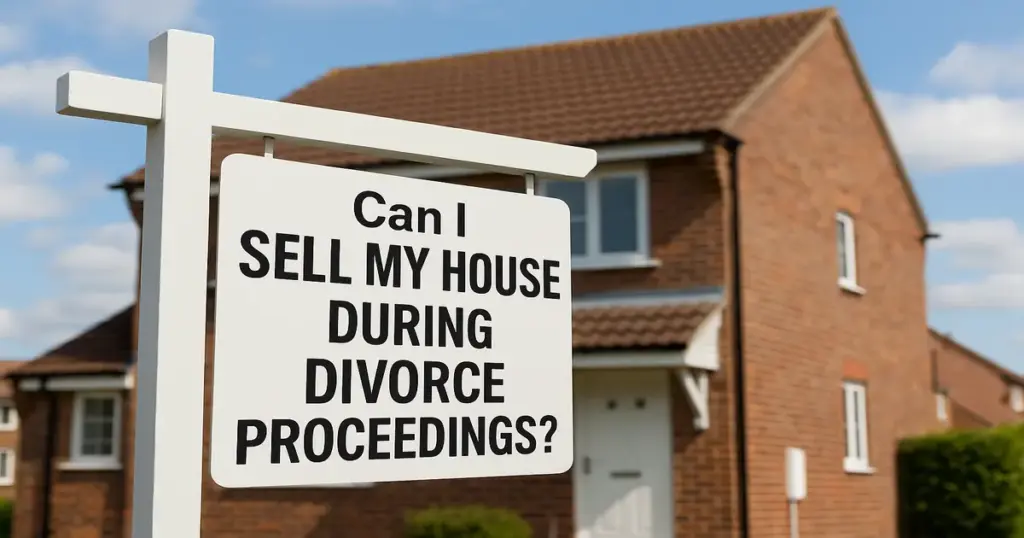Can I Sell My House During Divorce Proceedings? Your Questions Answered
Divorce is often one of the most emotionally and financially taxing experiences anyone can go through. You’re alone if you ask, “Can I sell my house during divorce proceedings?”.
Thousands of couples across the UK face this very dilemma each year. This guide offers clear, practical answers to help you navigate property sales during a divorce and avoid costly mistakes.
Understanding Property Ownership During Divorce
In the UK, property division during divorce depends heavily on whether you and your spouse own the home jointly or individually. The type of ownership—joint tenants or tenants in common—determines how the sale or transfer of the property is handled. If you’re joint tenants, you both own the property equally. If you’re tenants in common, you own specific shares, which can be unequal.
During a divorce, the courts will consider:
The financial needs of both spouses
Contributions (financial and non-financial) to the marriage
The welfare of any children
Current and future earning potential
These factors determine how the proceeds from any house sale will be split.
Legal Standing: Can I Sell My House During Divorce Proceedings?
The short answer is yes, but with conditions. Selling your house during divorce proceedings is legally possible in the UK, but it often requires mutual agreement or a court order if there is disagreement.
If one party does not consent to the sale, the other may have to apply to the family court to request an order for sale under the Trusts of Land and Appointment of Trustees Act 1996 (TOLATA).
It is essential to understand that while the property market allows you to sell a home anytime, a house under joint ownership cannot be sold by one party alone. Without legal authority, attempting to sell the home unilaterally could lead to legal consequences.
Why Sell During Divorce?
There are several reasons why couples choose to sell the house before finalising the divorce:
To pay off shared debts
To split the equity fairly
To avoid protracted legal disputes over who keeps the home
Because neither party can afford the mortgage alone
To secure new housing arrangements for children or both partners
According to the Office for National Statistics, over 100,000 couples divorce yearly in England and Wales. A large proportion of these cases involve the sale of jointly owned property.
Consent and Court Orders
If both spouses agree to the sale, the process is more straightforward. A solicitor or conveyancer can help with the transaction, and the equity can be divided according to any agreement or consent order.
However, if one party refuses to sell, the other may apply to the court for an order for sale. The court considers:
Who has primary care of the children
Financial resources of both parties
Availability of alternative housing
Contributions made to the family home
A judge may delay the sale until after children turn 18 or one party remarries, especially if children are involved.
What Happens to the Proceeds?
If a financial agreement is in place, the net proceeds (after mortgage and fees) are split according to that agreement. If not, either party can apply for a financial remedy order to settle disputes over money and assets.
Getting a Consent Order to make any agreement legally binding is advisable. This ensures neither party can make future claims on property or assets after the divorce is finalised.
Once the divorce has reached the Conditional Order stage (previously called the Decree Nisi), you can apply for a Consent Order through your solicitor or independently.
Practical Considerations Before Selling
Before asking “Can I sell my house during divorce proceedings?”, it’s essential to review the following steps:
Get a Valuation
Before deciding to sell, obtain at least two or three property valuations. This helps estimate how much equity each party may be entitled to after paying off the mortgage.
Speak to Your Lender
Inform your mortgage provider about the situation. They may offer options such as mortgage holidays, switching to interest-only, or adding/removing a name from the loan.
Legal Advice
Engage a family solicitor experienced in divorce-related property issues. They will help ensure your rights are protected and can draft any necessary orders.
Mediation
Before court, try mediation to resolve disputes. This process is less expensive and can often result in amicable agreements about property division.
Children
The court always prioritises children. Any decision about property sale must consider where the children will live and their stability.
Sell House Fast for Cash
Selling your house the traditional way—via estate agents—can take several months and introduce unnecessary delays and stress during divorce proceedings. For couples looking to move on quickly and avoid drawn-out negotiations, Sell House Fast for Cash offers a quicker, stress-free alternative.
We buy properties in any condition without the need for repairs, viewings, or chain-related delays. If you’re wondering, “Can I sell my house during divorce proceedings?” and need a solution that offers speed, privacy, and reliability, we are here to help.
Why choose us:
Get a free, no-obligation offer within 24 hours
Completion within 7 to 21 days
No estate agent or legal fees
Specialist support for properties with shared or disputed ownership
Discreet, confidential service during emotional times
Many divorcing couples have reached a fair financial outcome and secured their next chapter. Whether you’re in negotiations or already have a court order to sell, we can handle the complexities for you.
Can I Sell Without My Spouse’s Consent?
Not without consequence. If the property is in both names, consent from both parties is necessary. Selling without permission could lead to civil action for breach of trust. If the property is solely in your name, you can legally sell, but your spouse may still have a legal claim on the proceeds.
To protect yourself:
Register a home rights notice (for non-owning spouses)
Seek a court order if the other party is obstructive
Keep communication clear and documented
Can I Be Forced to Sell?
Yes. If the court deems selling the home necessary for fair financial settlement or in the children’s best interests, it can order a sale even if one party objects. This typically occurs when:
Neither party can afford to keep the home
Children are not living in the property
One party needs their share to secure new accommodation
Timing the Sale: Before or After Divorce Finalised?
You can sell before the divorce is finalised. Selling during divorce proceedings may speed up the overall process. However, it’s critical to ensure that both parties have a written agreement or a court order determining how proceeds will be divided to prevent future legal action.
Tax Considerations
Selling a jointly owned home during divorce can offer some tax benefits. The UK allows for a no-gain, no-loss transfer of assets between spouses in the tax year of separation. After this period, Capital Gains Tax (CGT) may apply.
Consult a tax advisor or solicitor to assess how the timing of the sale will affect your liabilities.
Financial Disclosure: Be Transparent
Whether you plan to sell or keep the home, both parties must provide full financial disclosure to the court or during mediation. Hiding assets or undervaluing property can backfire, leading to penalties or unfavourable judgments.
Final Thoughts: Plan With Clarity
Can I sell my house during divorce proceedings? Yes, but it requires caution, communication, and often legal advice. Whether the goal is to divide equity, start fresh, or avoid court battles, selling the home can be a step toward closure.
Engage the right professionals, stay transparent, and, above all, focus on stability—especially that of any children.
If you’re looking for speed and certainty in uncertain times, consider working with trusted cash buyers who specialise in sensitive property sales.
Frequently Asked Questions (FAQs)
Q1: Can I sell my house during divorce if my spouse disagrees?
Only with a court order. If your spouse does not consent, you must apply for an order for sale.
Q2: Will I get 50% of the sale proceeds?
Not always. Division depends on various factors, including financial needs, contributions, and the care of children. It is rarely a straightforward 50/50.
Q3: Can a court delay the sale?
Yes, especially if children are living in the home. The court may allow one spouse to remain in the property until the children reach adulthood.
Q4: What if I want to buy my spouse out?
You can do so by paying them their share of the equity, based on the current valuation. Legal and mortgage advice is strongly recommended.
Q5: How long does it take to sell a house during divorce?
Traditional sales may take 3–6 months or longer. If both parties agree, a fast cash sale can be completed in as little as 7 days.
Q6: Do I need a solicitor to sell the house?
Yes, conveyancing is still required to handle legal paperwork. You also need legal advice to protect your rights during the divorce.
Q7: What happens if the home is solely in my name?
Your spouse may have home rights even if you’re the legal owner. They can apply to the Land Registry to block a sale until the divorce is settled.
Q8: Will I pay Capital Gains Tax?
If the home was your primary residence and was sold within the same tax year of separation, CGT usually does not apply. Otherwise, you might incur liability.
Q9: Can we sell before the divorce is finalised?
Yes, you can sell before the divorce is finalised, as long as both parties agree or a court order is in place.
Q10: Is a quick cash sale legal during divorce?
Absolutely. A fast sale is legal if both parties consent and the transaction is appropriately handled with solicitors and a clear paper trail.
For couples experiencing the difficult road of separation, the right property decisions can help pave the way for emotional and financial recovery.
Whether you sell through the open market or opt for a quicker solution, always protect your rights—and peace of mind—with proper legal guidance.
Citizens Advice – Family and Divorce Guidance
Website: www.citizensadvice.org.uk/family/ending-a-relationship/
This resource offers clear, impartial guidance on separation, divorce, financial settlements, and housing rights.
Divorce and Separation
Website: www.gov.uk/divorce
Official UK government resource for starting divorce proceedings, applying for a financial order, and guidance on property division during divorce.
Resolution – Family Law Professionals
Website An organisation of family law professionals who promote non-confrontational resolutions in divorce. Includes a directory to find experienced solicitors near you.
Family Mediation Voucher Scheme
Website Explains the mediation process and offers government support to help pay for mediation sessions instead of going to court.
These resources are reliable and widely recognised for those navigating property sales, financial disputes, and housing concerns during divorce in the UK
Read our top Blogs:
Sell My Property Fast For Cash In Wandsworth
What to Do If Your House Won’t Sell: Fast Solutions That Work
How to Sell House Fast: Proven Tips to Get a Quick Sale Without Estate Agents
Call +447702210159 our friendly team for a same-day offer





